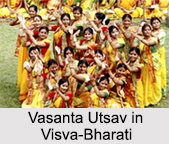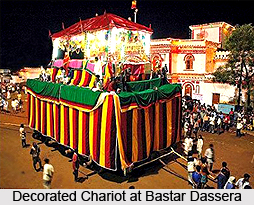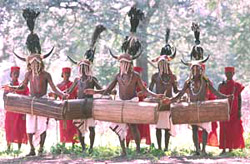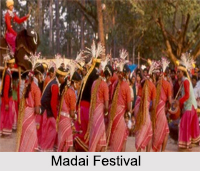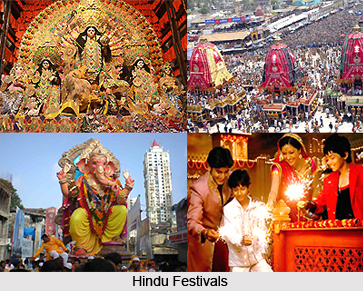 Hindu Festivals are mainly related with the religious events. The new year`s day of those who follow the solar calendar falls on the vernal equinox (Vishu) in mid-April. There is no common new year`s day for those {mostly in the North) who observe the lunar calendar. In Gujarat, the first day of the year is the one following Diwali and for some communities it is the first day of the month of Visakha in the Hindu calendar.
Hindu Festivals are mainly related with the religious events. The new year`s day of those who follow the solar calendar falls on the vernal equinox (Vishu) in mid-April. There is no common new year`s day for those {mostly in the North) who observe the lunar calendar. In Gujarat, the first day of the year is the one following Diwali and for some communities it is the first day of the month of Visakha in the Hindu calendar.
Hindus have festivals on the new and full moon.
Pongal
This is a New Year is called Pongal when the sun enters Capricorn around 12th of January. Pongal lasts for three days and sometimes lasts even longer. The first day is the Bhoga-Pongal is held when relatives and friends invite each other to entertainments and spend the time by enjoying with each other. Second day is the Perum Pongal which takes place in honour of the sun. Third day is the Mattu Pongal or the Cow Pongal. Early in the morning the cultivators sprinkle water on the corn of their fields. In the afternoon the cows and bulls are washed, their horns painted, they are dressed with trappings of leaves, flowers and coconuts. They are brought where the cow-keepers sprinkle saffron, water and mango-leaves upon them.
Durga Puja/ Dussehra / Navratri
Durga Puja or Dussehra or Navratri is a 9-day festival celebrated in honour of Goddess Parvati. Durga Puja represents the worship of Shakti is the form Devi Durga annihilating the demon Mahisasura. This festival is celebrated in different names and forms across the Indian subcontinent at the same time.
Navaratri
Navaratri is the first nine days of the month of Asvina. It has significance in different parts of India. The tenth day, Dussehra, is considered as Vijayadasami. Vijayadasami is venerated as the day of victory, when people in the North burn effigies of Ravana, the evil power according to the sacred Hindu epic Ramayana and his younger brother, Kumbhakarna. In the South, Goddess Saraswati is most famous and Navaratri is celebrated in South Indian households with a display of dolls.
Ayudha Puja
Ayudha Puja is an important festival of the Hindus. Ayudha Puja is celebrated in honour of the tools and instruments with which the people earn their livelihood. People offer money, grain, fruits, flowers and cloths, which the priests receive.
Aiyanar Festival
In Tamil Nadu people of every village hold a feast in the honour of Aiyanar. This feast is held after the first or the second harvest and lasts for seven to nine days. The images of Aiyanar and his wives are decorated and they are taken out in the street processions.
Birthdays of Hindu Gods
The birthdays of different deities are significant festivals of the Hindus which are celebrated according to the lunar calendar. Janmashtami is a significant festival which is celebrated on the birthday of Lord Krishna. It is celebrated on the eighth day of the fading moon of Shravana. Rama Navami celebrates the birthday of Lord Rama on the ninth day of the bright half of Phalguna. Ganesh Chaturthi, the birthday of Lord Ganesha is mainly observed in Maharashtra. It is observed on the fourth day of the diminishing moon in Bhadra pada.
New Year festivals
New Year for Hindus is celebrated in either March or the month of April through an array of festivals in different Indian states. These festivals are Baisakhi in Punjab, Jude Sheetal in Bihar and Jharkhand, Bohag Bihu in north east, Pohela baishakh in Bengal, Gudi Padwa in Maharashtra, Ugadi in South India, and Vishu in Kerala.
Diwali
Diwali is the festival of lights which occurs in the month of Karthika. Every house is illuminated with small diyas. Diwali is also a festival to commemorate the homecoming of Lord Rama after killing Ravana.
Onam
Onam is an important festival of Kerala which is associated with Vamana, an avatar of Lord Vishnu, who banished the asura emperor Bali to the nether world.
Basant Panchami
Basant Panchami is the festival that occurs in the season of spring. Goddess Saraswati is worshipped as the Goddess of learning, wisdom, music, and aesthetics.
Holi
The festival of Holi symbolizes the destruction by fire of evil personified by Holika, the demon sister of Hiranyakashipu. This festival is celebrated across the country with colours and sweets.
Shivaratri
The festival of Shivaratri is observed in the month of Magha. It is observed in honour of Lord Shiva. Shivratri refers to the night when Shiva performs the heavenly dance called Tandava.
Naga Panchami
Nag Panchami is a famous Hindu festival of Maharashtra celebrated in the honour of the Hindu snake God, Shesha Nag. It is celebrated on the 5th day during the month of Shravan. The significance of Nagpanchami is to pacify the active snakes and discourage them from being a threat to humans during the rainy seasons.
Raksha Bandhan
Raksha Bandhan or Rakhi is observed on the last day of the Hindu lunar calendar month of Shraavana. A sacred thread of protection embellished with the love and affection is tied on a brother"s wrist by a sister as a bond of love and protection between them.
Karva Chauth
Karva Chauth is a one-day festival celebrated annually by married Hindu women in which they observe a fast from sunrise to moonrise and pray for the well-being and long life of their husbands. It falls on the fourth day of the dark fortnight in the month of Kartik of the Hindu lunar calendar.
Hindu festivals reveal the socio-cultural diversities of the different communities owing their origin from the Hindu religion. The festivals not only reveal the diversities, but also point to the cultural significance of the different communities living in the sacred abode of India.

